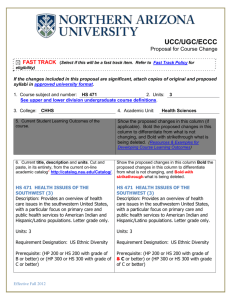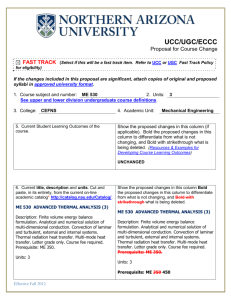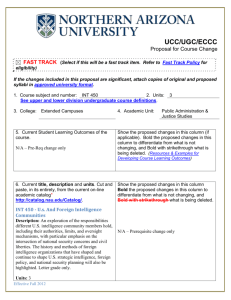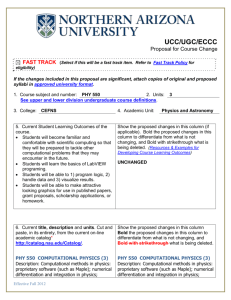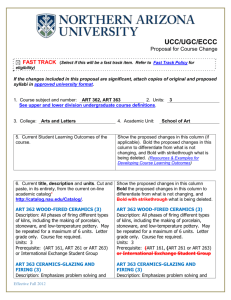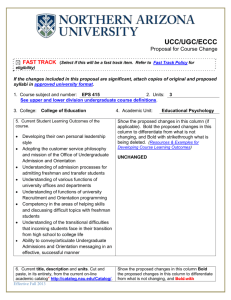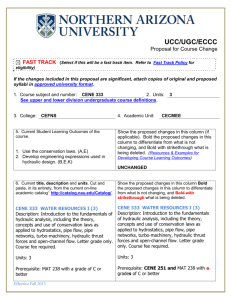4. Academic Unit
advertisement
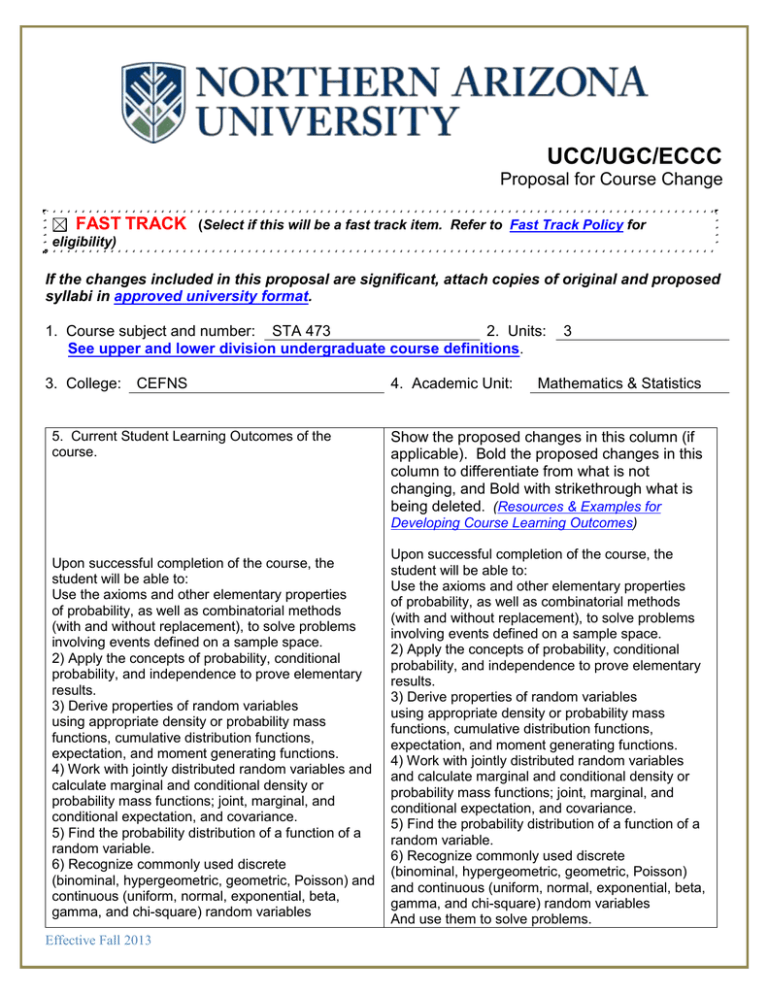
UCC/UGC/ECCC Proposal for Course Change FAST TRACK (Select if this will be a fast track item. Refer to Fast Track Policy for eligibility) If the changes included in this proposal are significant, attach copies of original and proposed syllabi in approved university format. 1. Course subject and number: STA 473 2. Units: See upper and lower division undergraduate course definitions. 3. College: CEFNS 5. Current Student Learning Outcomes of the course. 4. Academic Unit: 3 Mathematics & Statistics Show the proposed changes in this column (if applicable). Bold the proposed changes in this column to differentiate from what is not changing, and Bold with strikethrough what is being deleted. (Resources & Examples for Developing Course Learning Outcomes) Upon successful completion of the course, the student will be able to: Use the axioms and other elementary properties of probability, as well as combinatorial methods (with and without replacement), to solve problems involving events defined on a sample space. 2) Apply the concepts of probability, conditional probability, and independence to prove elementary results. 3) Derive properties of random variables using appropriate density or probability mass functions, cumulative distribution functions, expectation, and moment generating functions. 4) Work with jointly distributed random variables and calculate marginal and conditional density or probability mass functions; joint, marginal, and conditional expectation, and covariance. 5) Find the probability distribution of a function of a random variable. 6) Recognize commonly used discrete (binominal, hypergeometric, geometric, Poisson) and continuous (uniform, normal, exponential, beta, gamma, and chi-square) random variables Effective Fall 2013 Upon successful completion of the course, the student will be able to: Use the axioms and other elementary properties of probability, as well as combinatorial methods (with and without replacement), to solve problems involving events defined on a sample space. 2) Apply the concepts of probability, conditional probability, and independence to prove elementary results. 3) Derive properties of random variables using appropriate density or probability mass functions, cumulative distribution functions, expectation, and moment generating functions. 4) Work with jointly distributed random variables and calculate marginal and conditional density or probability mass functions; joint, marginal, and conditional expectation, and covariance. 5) Find the probability distribution of a function of a random variable. 6) Recognize commonly used discrete (binominal, hypergeometric, geometric, Poisson) and continuous (uniform, normal, exponential, beta, gamma, and chi-square) random variables And use them to solve problems. And use them to solve problems. 7) Express proofs, derivations, and other results in a coherent form using correct mathematical language and reasoning. 7) Express proofs, derivations, and other results in a coherent form using correct mathematical language and reasoning. 6. Current title, description and units. Cut and paste, in its entirety, from the current on-line academic catalog* http://catalog.nau.edu/Catalog/. Show the proposed changes in this column Bold the proposed changes in this column to differentiate from what is not changing, and Bold with strikethrough what is being deleted. STA 473 Introduction To Mathematical Statistics I (3) Elementary combinatorial probability theory, random variables, probability distributions, and moments. Letter grade only. Prerequisite: MAT 238 with grade of C or better STA 473 Introduction To Mathematical Statistics I (3) Elementary combinatorial probability theory, random variables, probability distributions, and moments. Letter grade only. Prerequisite: MAT 238 and (STA 270 or STA 275) with grades of C or better *if there has been a previously approved UCC/UGC/ECCC change since the last catalog year, please copy the approved text from the proposal form into this field. 7. Justification for course change. Elementary statistical concepts and methods are relied on in this course and subsequent courses. Since STA 270 or 275 is required of mathematics majors, this will not add any courses to a students program, it will merely insure that they have the elementary course prior to taking STA 473. 8. Effective BEGINNING of what term and year? See effective dates calendar. Fall 2014 IN THE FOLLOWING SECTION, COMPLETE ONLY WHAT IS CHANGING CURRENT Current course subject and number: PROPOSED Proposed course subject and number: Current number of units: Proposed number of units: Current short course title: Proposed short course title (max 30 characters): Current long course title: Proposed long course title (max 100 characters): Current grading option: letter grade pass/fail or both Current repeat for additional units: Proposed grading option: letter grade pass/fail or both Proposed repeat for additional units: Current max number of units: Proposed max number of units: Current prerequisite: MAT 238 with grade of C or better Proposed prerequisite (include rationale in the justification): MAT 238 and (STA 270 or STA 275) with grades of C or better Effective Fall 2013 Current co-requisite: Proposed co-requisite (include rationale in the justification): Current co-convene with: Proposed co-convene with: Current cross list with: Proposed cross list with: 9. Is this course in any plan (major, minor, or certificate) or sub plan (emphasis)? Yes No If yes, describe the impact. If applicable, include evidence of notification to and/or response from each impacted academic unit. BS Mathematics-related plan change being submitted concurrently. Statistics Minor (elective)-no impact. 10. Is there a related plan or sub plan change proposal being submitted? If no, explain. Yes No 11. Does this course include combined lecture and lab components? Yes If yes, include the units specific to each component in the course description above. No Answer 12-15 for UCC/ECCC only: 12. Is this course an approved Liberal Studies or Diversity course? If yes, select all that apply. Liberal Studies Diversity Yes No Yes No 14. Is this course listed in the Course Equivalency Guide? Yes No 15. Is this course a Shared Unique Numbering (SUN) course? Yes No 13. Do you want to remove the Liberal Studies or Diversity designation? If yes, select all that apply. Liberal Studies Diversity Both Both FLAGSTAFF MOUNTAIN CAMPUS Scott Galland 12/2/2013 Reviewed by Curriculum Process Associate Date Approvals: 01/27/2014 Department Chair/Unit Head (if appropriate) Effective Fall 2013 Date Chair of college curriculum committee Date Dean of college Date For Committee use only: UCC/UGC Approval Date Approved as submitted: Yes No Approved as modified: Yes No EXTENDED CAMPUSES Reviewed by Curriculum Process Associate Date Approvals: Academic Unit Head Date Division Curriculum Committee (Yuma, Yavapai, or Personalized Learning) Date Division Administrator in Extended Campuses (Yuma, Yavapai, or Personalized Learning) Date Faculty Chair of Extended Campuses Curriculum Committee (Yuma, Yavapai, or Personalized Learning) Date Chief Academic Officer; Extended Campuses (or Designee) Date Approved as submitted: Yes No Approved as modified: Yes No Effective Fall 2013
